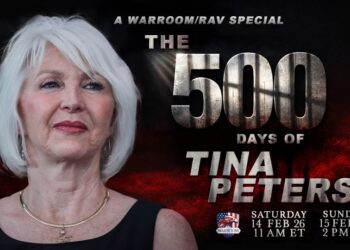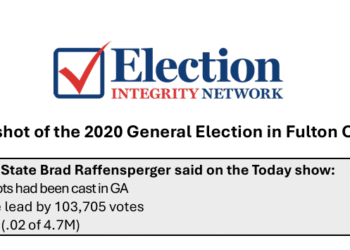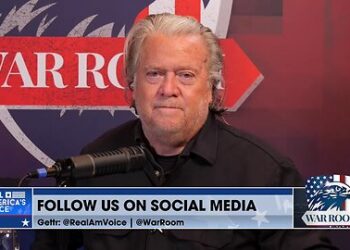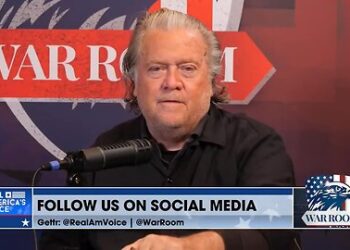Peter Navarro’s America First policies, particularly those targeting the revitalization of American manufacturing, have deep roots in real-world experiences and stories. The poignant narratives of individuals like J.D. Vance, author of “Hillbilly Elegy,” have significantly influenced Navarro’s understanding and advocacy for these policies.
Navarro talked about these ideas on Thursday’s WarRoom program.
Navarro said his journey into the heart of American economic struggles began in the early 2000s while teaching at the University of California, Irvine. He observed a troubling trend: middle-aged students in his business school classes were losing their jobs at an alarming rate. This phenomenon piqued his interest and led him to investigate the underlying causes. His research pointed to a single, overwhelming culprit—China’s aggressive economic strategies following its entry into the World Trade Organization.
Navarro’s deep dive into this issue revealed a multifaceted assault on American jobs. He said that it wasn’t just about cheap labor; it was about intellectual property theft, currency manipulation, and a host of other unfair trade practices. His findings were not merely academic; they were rooted in the real suffering of American workers. These workers, who had lost their jobs and livelihoods, mirrored the experiences described by J.D. Vance in “Hillbilly Elegy.”
Vance’s memoir chronicles his life growing up in the Rust Belt, an area severely impacted by the decline of manufacturing. His story is one of personal and communal struggle, detailing how factory closures and job losses led to widespread social and economic decline. Navarro saw Vance’s narrative as a microcosm of the broader American experience—a vivid, on-the-ground illustration of the issues he was studying from an academic vantage point.
This convergence of personal stories and academic research is the foundation of Navarro’s resolve to champion policies that would defend American workers and manufacturers. His book, “The Coming China Wars,” which highlighted the destructive impact of China’s economic policies, became a key piece of literature that resonated with Donald Trump. Navarro’s insights and prescriptions for addressing these challenges were directly influenced by the real-life experiences of people like Vance.
Navarro’s policies, as implemented during his tenure in the Trump administration, focused on reversing the decline of American manufacturing. He advocated for tariffs and trade policies designed to protect American industries from unfair foreign competition. These measures were not merely about economics; they were about restoring dignity and hope to communities devastated by industrial decline.
The America First agenda sought to rebuild the industrial base that Navarro and Vance both saw as essential to the nation’s economic and social fabric. For Navarro, manufacturing was not just about jobs; it was about the very essence of American resilience and self-reliance. The loss of manufacturing jobs had led to the erosion of community structures, as seen in Vance’s Rust Belt experiences. Restoring these jobs was, in Navarro’s view, crucial for national security and economic independence.
Navarro’s engagement with real-world narratives provided a powerful impetus for his policy directions. The stories of American workers, exemplified by Vance’s memoir, constantly reminded him of the stakes involved. Therefore, Navarro’s America First policies were deeply personal and grounded in the lived experiences of countless Americans whose lives had been upended by global economic shifts.
The narratives of individuals like J.D. Vance were instrumental in shaping Peter Navarro’s America First policies. These stories brought to light the human cost of economic decisions. They fueled a policy agenda aimed at revitalizing American manufacturing, protecting jobs, and restoring the communities that form the nation’s backbone.






Unlike Vance, I’m not that smart but in 2002 with 1 year and 3 months to go before a company pension kicked in, the plant in which I worked was sold and my pension with it. I receive vested rites of about $800 a month which is about half of what the pension would have been. That put me in the micro you were seeing from 30K feet. While China can be blamed for many things it was not they that took the jobs. Our own people moved manufacturing there to take advantage of not only cheap labor but lax environmental regulations if they existed at all and cheap coal fired electricity. Looking at this from a purely monetary view it made sense. Looking at it from a National/Patriotic view it was treason to undermine the country in which you made your fortunes. Trump took the banner from Pat Buchanan who had not the resources to fund a primary race for if he did he would have been president before DJT. However, there is not a human alive that I know of that can withstand the slings and arrows Trump faces on a daily basis. He has stood strong never wavering and it is obvious to anyone with reason that President Trump not only loves America but the average working citizen.